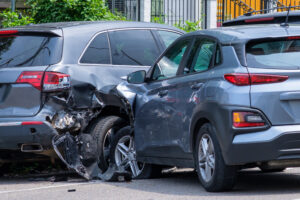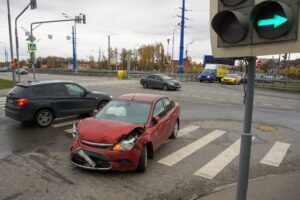Auto accidents can be caused by a wide variety of sources. One of the most severe and dangerous causes of accidents is reckless driving, but many people may be unsure about what constitutes “reckless driving.” Following an accident, it is vital to be familiar with the criteria for reckless driving, what types of behaviors may be classified under the term, the potential penalties that may result, and how to pursue compensation if you suffered an injury in such an accident. By being informed, you can better prepare to seek a resolution.
If you or a loved one suffered an injury in an accident that was caused by reckless driving, you have options available to you for pursuing compensation. A knowledgeable personal injury attorney can explain the legal process, assess your case, and guide you in the right direction to seek the fair financial compensation you deserve. By working with skilled legal representation, you can avoid any confusion and complication that can — and often does — arise when attempting to handle these situations independently. Contact a Bellingham personal injury attorney today to schedule a consultation to discuss your case.
Understanding Reckless Driving
While many traffic violations exist, reckless driving is far more severe than others. Reckless driving involves intentionally making a significant breach of road safety and willfully disregarding the accepted vehicle operating standards. This wanton disregard for the safety and well-being of others on the road and the preservation of their property goes beyond simple carelessness. Such deliberate actions put other individuals at serious risk.
One of the critical elements of a reckless driving charge is intent — determining if the accused driver knowingly engaged in dangerous behavior while aware of the possible consequences of their actions. The legal penalties of a reckless driving charge can be significant, including hefty fines, the suspension of the driver’s license, and jail time. The potential civil consequences are also substantial — personal injury lawsuits seeking compensation for injuries and damages suffered by victims of the accident.
Reckless Driving Vs. Negligent Driving
It is a common mistake for people to confuse reckless driving with negligent driving, but they are distinct situations with different legal culpability. Whereas negligent driving involves a driver failing to exercise reasonable care for others on the road and unintentional mistakes, reckless driving pertains to situations in which a driver knowingly and intentionally violates traffic safety rules and actively puts other drivers and passengers at risk of injury or death. While negligent driving may involve failing to check blind spots or not obeying traffic signals, reckless driving may involve aggressive actions and excessive speeding.
Though both negligent driving and reckless driving can lead to accidents, injuries, or even fatalities, reckless driving is treated far differently from a legal standpoint — both criminally and in civil suits.
Common Examples of Reckless Driving

Reckless driving can be an umbrella term that encompasses a wide range of dangerous driving behaviors that put others on the road at significant risk. Some of the more common examples of reckless driving that endangers everyone on the road include:
- Excessive Speeding: Driving far beyond the legal speed limit, often in traffic
- Aggressive Driving: Tailgating, frequent and careless lane changes, and road rage
- Running Red Lights & Stop Signs: Ignoring traffic signs and increasing the risk of a crash
- Street Racing: Illegally engaging in races on public roads
- Driving Under the Influence: Operating a vehicle while impaired by drugs or alcohol
The actions listed above show an intentional disregard for the safety of others and a willingness to risk significant consequences, such as devastating injuries, substantial property damage, or even fatalities.
Legal Criteria for Reckless Driving
From a legal standpoint, a traffic accident must meet specific criteria to be considered reckless driving. At its root, reckless driving involves driving a vehicle in a way that demonstrates an intentional disregard for safety. When an individual faces a reckless driving charge, the legal system will consider several factors besides the driver’s actions, including road conditions, the presence of other vehicles at the time of the accident, and other circumstances. The court will assess whether the driver’s behavior posed a significant risk to others and if the actions were intentional. The primary assessment depends heavily on intent, specific driving behaviors, and the jurisdiction’s laws.
Intent
The most important factor when determining whether or not the driver responsible for an accident should be charged with reckless driving is intent. While merely negligent drivers may cause accidents by unintentionally failing to adhere to laws or safety standards on the road, someone guilty of reckless driving makes a conscious decision to put other people at risk. Following an accident in which a driver is suspected of engaging in reckless driving, the court will focus on determining whether the driver showed a willful disregard for public safety. Proving intent is the objective in prosecuting reckless driving cases because it will emphasize legal culpability on the part of the driver responsible for the accident and lead to severe penalties in both criminal and civil cases.
Specific Reckless Driving Behaviors

A reckless driving charge can result from a wide range of behaviors that indicate intentional disregard for the safety of others. Some of the most common behaviors that are often recognized as reckless driving include:
- Excessive Speeding: Driving faster than the legal speed limit, particularly in crowded or residential areas
- Tailgating: Following another vehicle too closely, increasing the chances of an accident
- Street Racing: Racing on public roads, at great risk to bystanders and participants of the illegal race
- Fleeing Law Enforcement: Attempting to evade police, resulting in a dangerous and often high-speed chase
- Driving Under the Influence: Driving a vehicle while impaired by drugs, alcohol, or other substances
The driving behaviors listed above are obvious violations of traffic laws and present a significant danger to anyone in vehicles or nearby. Clear examples of reckless driving that cause accidents, injuries, or fatalities will face severe penalties.
State Laws
Though core concepts of reckless driving are mainly consistent across the board, different states can vary slightly in how they define and penalize such a crime. States can set their thresholds for driving a certain number of miles per hour beyond the legal speed limit to categorize a case as reckless driving automatically. Other states may take other factors, such as weather conditions, the context of the driver’s behavior, and the actions of other vehicles into account when deliberating whether an offense rises to the level of reckless driving. Penalties administered for reckless driving can also vary from one state to another, with the level of fines, length of license suspensions, and mandatory jail time being different.
Consequences of Reckless Driving
As mentioned above, reckless driving is a severe charge with significant penalties and potential criminal and civil liability. The legal consequences can be severe, even beyond the danger the guilty driver poses to themselves and others on the road and in the vicinity of the accident. Reckless driving can result in heavy fines, the suspension of the driver’s license, and time behind bars. Long-term impacts can include financial consequences such as difficulty obtaining insurance coverage and being sued by accident victims. The severity of the penalties for reckless driving is intended to serve as a strong deterrent.
Criminal Penalties
While the specific criminal penalties for reckless driving differ depending on the jurisdiction, the punishments always reflect the seriousness of the act. Criminal penalties may range from significant fines to probation, community service, or the loss of driving privileges and jail time. In instances of reckless driving that result in catastrophic injuries or fatalities, the charge may be elevated to a felony, which carries even more severe penalties. Carrying a reckless driving conviction on a permanent record can also affect employment opportunities, professional licenses, and more.
Civil Liability

Aside from the notable criminal consequences of reckless driving, individuals guilty of such an act open themselves to a broad scope of civil liability. If an incident of reckless driving leaves injured victims or significant property damage in its wake, the driver may end up being sued by the injured parties. A civil lawsuit against an individual determined to have engaged in reckless driving often leads to large financial judgments to compensate victims for medical bills, lost income, property damage, and pain and suffering. A successful civil lawsuit against a reckless driver can impact the defendant’s finances on a long-term basis, including the seizure of assets and future earnings.
Impact on Insurance
Insurance premiums and the ability to procure or maintain auto insurance coverage can also be significantly affected by a reckless driving incident. Like law enforcement and governmental institutions, insurance companies take reckless driving seriously, often classifying it as enough of a red flag to raise the cost of coverage or cancel coverage altogether. The long-term financial cost of obtaining insurance coverage in the wake of a reckless driving accident can be substantial. The combination of criminal, civil, and financial penalties for reckless driving can often be more than a guilty driver can bear to remain behind the wheel.
Reckless Driving & Auto Accidents
Reckless driving is one of the leading causes of severe injury or fatal car accidents. If a motorist drives recklessly, the likelihood of an accident increases dramatically. Due to the high speeds and erratic behaviors often present in reckless driving incidents, the result usually tends to be even more catastrophic than typical auto accidents. Such accidents can lead to not only significant risk of physical harm and potential fatality but also massive financial ramifications, legal penalties, and life-altering consequences — for the driver and the victims. The frequent connection between reckless driving and car accidents emphasizes the need for safe driving practices and severe deterrents for perpetrators.
Why You Need a Lawyer
Effective legal representation is critical when you have suffered an injury or property damage in a reckless driving accident. A strong personal injury lawyer can provide the following benefits:
- Case Evaluation: Honest determination of the strength of your claim and the level of compensation you should seek.
- Evidence Collection: Gathering police reports, medical records, witness statements, and other vital pieces of evidence.
- Negotiation Skills: Advocating for you in discussions with other parties, including insurers and legal representation for the defendant.
- In-Court Representation: If your case goes to court, you need an experienced litigator.
Legal matters are always complicated by nature, but when you have so much depending on the outcome of your injury claim, you need skilled guidance to help navigate the complex legal landscape.
Contact an Experienced Reckless Driving Injury Attorney
If a driver does not observe the traffic laws and take proper safety precautions behind the wheel, the risk of an accident increases significantly. When a driver knowingly and intentionally breaks the law and endangers the drivers and passengers on the road around them, they are engaging in reckless driving, a serious crime that puts lives at risk and causes severe injuries and property damage. Accidents that result from reckless driving can lead to victims suffering catastrophic and potentially life-altering injuries and the financial burdens that come along with them.

Reckless driving can have devastating consequences. An experienced reckless driving injury attorney will have extensive knowledge of the relevant laws and regulations, as well as the experience to build a strong case on your behalf.
When you’ve found yourself in the aftermath of an accident caused by another party’s reckless driving, you owe it to yourself to seek fair compensation and other drivers on the road to hold the responsible driver accountable. By working with an experienced personal injury lawyer, you can build a strong case that can put you in a position to obtain the financial relief you need after your accident. A successful lawsuit can result in you being awarded compensation to help pay your medical costs, cover lost income, and repair property damage. You don’t have to do this alone — reliable, skilled representation is available. Reach out today and contact a knowledgeable personal injury lawyer to schedule a consultation and discuss the details of your situation so you can start pursuing the outcome you deserve.